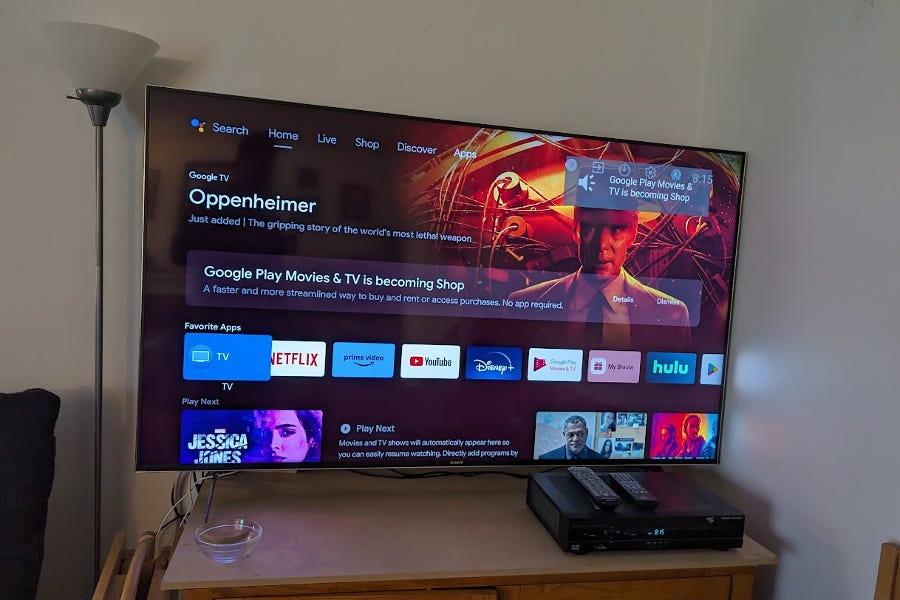Who's Afraid of Oppenheimer?
A surprising number of academics, as it turns out
Christopher Nolan’s Oppenheimer has finally hit streaming services (well, video-on-demand…) this week, which means we’ll have an interesting decision coming up for some future Movie Night. Back when “Barbenheimer” was a Thing, The Pip was rooting for Nolan, and asked a few times whether we could watch it. Given that he’s 12, though, I’m not confident he’s going to like the actual film…
Given that it’s three hours of people talking in rooms, plus a few nude scenes, I’m not exactly surprised that The Pip and his contemporaries haven’t seen it. What is a bit surprising to me, given that the movie made close to a billion dollars at the box office, is how few of my colleagues have seen it. I’ve mentioned it a bunch of times at work, with different groups of people, to a near-universal “Enh, haven’t see it.”
I find this a little surprising, and frankly a bit disappointing, because I’d love to have someone to have an in-person conversation with about it. The other massive smash of the summer, Barbie, has gotten a big push (I haven’t seen that; I pitched it for Movie Night when it first hit streaming, but both kids declined), and multiple on-campus events using it as a hook, but when I’ve brought Oppenheimer up with colleagues in STEM, in History, and even the folks who teach Film Studies, nobody had seen it. It’s really pretty frustrating.
I’ve pitched the idea of doing a screening and panel discussion of Oppenheimer sometime in the Winter term, close to the Oscars, and it looks like we’re going to give that a go. When I mention that to people, I’ve gotten a lot of “Oh, that sounds great, maybe you can explain all the science!” Which is mildly flattering, but also another dead giveaway that nobody has seen it, because there’s next to no science in it— which is kind of fitting, because Oppenheimer’s contributions to the Manhattan Project were less scientific than managerial. In terms of explaining technical context, the film is less in need of a physicist than a political scientist who could lay out the taxonomy of the different kinds of Communists and the backstory of the various committees taking testimony on screen.
I find the whole thing pretty frustrating in a Two Cultures context, particularly given the regular grandiose rhetorical invocations of the need to step outside of STEM to appreciate the importance of complexity and grappling with Big Questions that pervade academia. And yet, here’s a film that works really hard to put Big Questions front and center in a way that’s surprisingly compelling, but because it’s superficially about Science Things, everybody has passed it over in favor of a candy-colored pop presentation of comfortable tropes about gender issues.
Anyway, it’s available digitally now, which I hope will get some more people to check it out. I would definitely encourage people to watch it; if you want a bit more detail, I wrote up some instant reactions when I saw it back in July, and some reactions to the #discourse about it a few days later. I also wrote a thing spinning off a much-mocked tweet by this week’s Main Character, about how to inspire physicists through film. It’s a long and intense movie, but not in a way that should scare people off, and it’s well worth seeing just as a remarkable demonstration of filmmaking craft.
It feels silly to be making a pitch for a movie that’s grossed $950 million, but here we are. If you’d like to see whether there’s any additional follow-up to this, here’s a button:
And if you’d like to discuss Oppenheimer in asynchronous text form, or try to convince me to make time to watch Barbie, the comments will be open:



I’m up for a discussion. I haven’t seen the movie yet primarily because I wrote a history of the development of atomic weapons spanning 1939-49 (first published in 2009), and I’d figured Nolan wouldn’t be able to get all this into 3 hours without doing violence to both the science and the history. However, I resolved to watch it on streaming, and will do so as soon as I can.
My whole family did the Barbenheimer thing opening weekend (that is a lot of movie to get through on a Friday night after work) and I think most of us enjoyed Barbie more (while still also liking Oppenheimer). I did kind of hope there'd be more physics in it, but it makes sense that there's not.